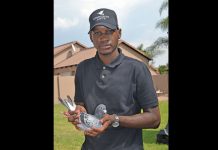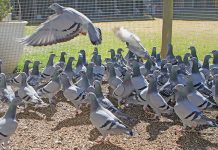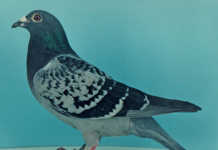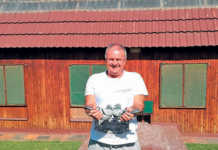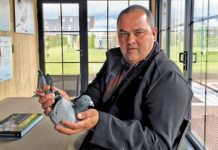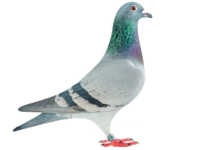Without super health, racing pigeons cannot be expected to perform well. A good health programme starts with hygienic pigeon-keeping. Start in the breeding loft by first removing all the pigeons to another loft section. Now scrub from ceiling to perches, nest boxes and floor.
Then clean and disinfect food trays and water bowls. My product of choice is Virukill in a solution of 2,5ml to 2â„“ of water. First spray the interior of the loft, perches, water bowls and food trays. Get everything dust-free. Spray the loft a few times with doors and windows open. Place the food trays and water bowls out in the sun to dry properly.
Remove the water bowls and food trays at night. Rats and mice drink and urinate in the water. Spray the pigeons’ bodies, keeping the spray a safe distance away from the head and eyes. Otherwise, if they are tame enough, you can give them a forced hand bath in the Virukill Avisafe water. Use a 10â„“ empty container and fill it with a lukewarm Virukill Avisafe solution.
Hold the pigeon with both hands and slowly lower it into the tub, not allowing it to jerk and keeping the head above water. Avoid splashing into its eyes.Prevent it from flying out. Fan the primary flights and slowly submerge the upper wing in the bath. Ensure that it soaks properly for a few seconds, with each wing alternately fanned. Clean and dry the feet before replacing the bird in the disinfected loft. Make sure that the loft is properly ventilated beforehand.
Advice from Dr OC Botha
During the Open Day arranged by Turf Pets, specialist advice was given by veterinarian Dr OC Botha. I made some notes on salmonella (paratyphoid):
- In his book, Dr L Schrag explains that salmonella is also called wing sickness because one of its symptoms is wing paralysis. Leg paralysis is also notable. Nervousness and turning of the head is often noted but there are a number of diseases that affect the nerves. The paralysis symptoms, too, are not restricted to salmonella.
- Salmonella, also called paratyphoid, has increasingly become problematic in South Africa over the past five years.
- Young pigeons are the most vulnerable and survivors often become carriers. Frequent stool tests are necessary.
- In a carrier state, the host pigeon often shows no signs of the disease but may infect the entire flock. Salmonella is mainly found in the crop milk and stools.
- The eggs of infected hens will, in most cases, also be infected and the young are born with the disease (ovarian infection). The disease is also spread through contaminated dust.
General preventative treatment is advised 10 days before mating breeding pairs and again after the breeding season.

